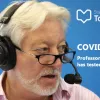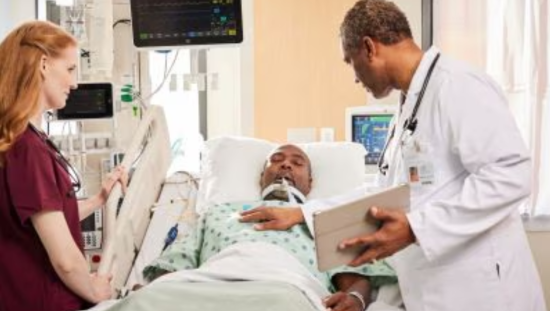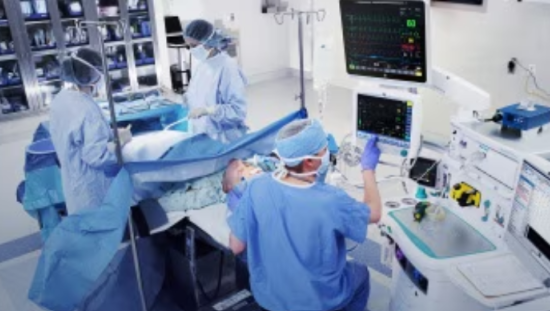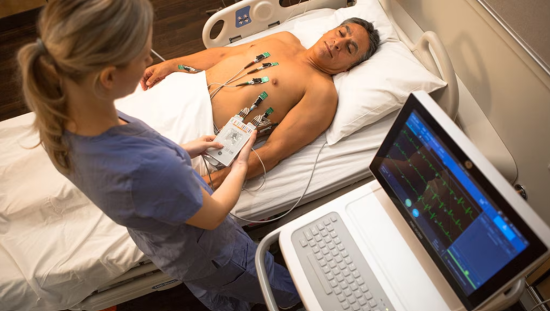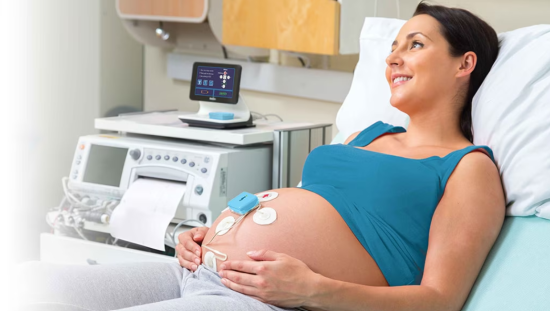#1. Wireless wearables on the ward, the new WWW revolution?
Frederic Michard discusses continuous monitoring in this podcast provided by Top Med Talk for Euroanesthesia 2019
Show Notes
Transcript
Speakers
There are 4.2 million patients who die within 30 days following surgery on the planet every year: more than HIV, Malaria, and Tuberculosis combined, making it the third leading cause of death.1
Learn how improving the way patients are monitored may help detect deterioration and reduce mortality in this Clinical View TopMedTalk podcast with Frederic Michard.
This podcast was recorded by TopMedTalk on Euroanesthesia 2019 in Vienna, Austria. Listen to this podcast from the TopMedTalk platform here.
1. Global burden of postoperative death. Lancet. https://www.thelancet.com/journals/lancet/article/PIIS0140-6736(18)33139-8/fulltext. Last accessed 12/18/2020.
Top Med Talk.
Desiree Chappell: Hello, I'm Desiree Chappell, and this is Top Med Talk. We are live from the European Anesthesiology Congress, Euro Anesthesia 2019 in Vienna, and I'm here with editor and chief of Top Med Talk, Monty Mythen. Hello Monty.
Monty Mythen: Hi, Desiree. We're having a, we're having a busy day.
Desiree Chappell: We are.
Monty Mythen: It's good.
Desiree Chappell: You know, it's funny, I tried not to schedule too much, but
Monty Mythen: You said that we would be allowed to at least go to the bathroom every now and again, but that's been a false promise.
Desiree Chappell: I thought, it is, I know, I'm sorry.
Monty Mythen: But, at least we're not drinking anything, so we're not [inaudible 00:00:29].
Desiree Chappell: Could be an issue later on.
Monty Mythen: The need for that, so.
Desiree Chappell: Well, and we've met up with some new friends, but we've also been able to catch up with some old friends, too. And, we have our guest with us this afternoon, Frederic Michard. He was a guest and a very special friend. Frederic, how are you?
Frederic Michard: I'm very good, Desiree.
Desiree Chappell: Good. So, um-
Frederic Michard: Nice to see you.
Desiree Chappell: It is very nice to see you. Thank you for coming and sitting down with us. And, I know that when we caught you, you were in a rush because you were just coming from a session that you were doing. So
Frederic Michard: Yeah, sorry I was a bit late, but, yeah.
Desiree Chappell: Oh, no, no, no, no.
Frederic Michard: It was a busy session with many questions at the end.
Desiree Chappell: That's always a good sign.
Frederic Michard: Exactly.Exactly.
Desiree Chappell: Yeah.
Frederic Michard: A lot of interest. Was a session about computers, you know.
Desiree Chappell: Yeah?
Frederic Michard: How computers could help us during surgery with closed loop system, but also after surgery. I was, I was giving a lecture on, uh, wearable centers for monitoring patients on the ward.
Desiree Chappell: Yeah. What, so, remind me the title of your, of your, presentation that your...
Frederic Michard: Oh, was Wireless Wearables for the Wards. Like, the, you know, the new WWW [inaudible 00:01:28] question mark.
Desiree Chappell: I love it. I thought about, when you said that to me, I'm like, that's so awesome. The WWW, the new revolution.
Frederic Michard: Yeah, I know.
Desiree Chappell: I think it's gonna be good. I know we've talked about this before, but, um, I think it definitely warrants talking about it again. Can you tell us a little bit about what's going on in that space? And, uh, what we can expect to see?
Frederic Michard: Yeah, so, I mean, I used in my presentation a very recent paper published in the long set. It's a very short paper, but they, they look at the global burden of, uh, of surgery, of post [inaudible 00:02:00] complications, actually.
Desiree Chappell: Yeah.
Frederic Michard: And, they claim that there are 4.2 million patients who die within 30 days following surgery on the planet every year.
Desiree Chappell: Wow, that's huge.
Frederic Michard: It's huge, and, uh, this is actually the third leading cause of death.
Desiree Chappell: Yeah-
Frederic Michard: That's what they claim.
Desiree Chappell: We've talked about that. Yeah.
Monty Mythen: That's more than HIV.
Frederic Michard: Exactly.
Desiree Chappell: It is.
Frederic Michard: More than HIV, Malaria, and Tuberculosis combined.
Desiree Chappell: Combined, right. Yeah.
Frederic Michard: So, you know, of this paper.
Desiree Chappell: Yeah, that paper.
Frederic Michard: It's a very powerful paper, and statement, of course. Very useful to stop and kick off a, a discussion on the topic.
Monty Mythen: But, but, is, the suggestion is that that, much of that is avoidable? Otherwise, is it, is it, there's a balance. Because, sometimes you need the surgery to try and save your life, and part of it is your life may not be savable.
Frederic Michard: Of course. I mean, we're not going to be able to prevent all the deaths, a, all these deaths. But, uh, but some are preventable.
Monty Mythen: Yeah.
Frederic Michard: We know that. There are many medical complications we can, we can prevent by improving the way we manage patient during surgery, but also, and that was my point, uh, to, uh, by improving the way we monitor patients, uh, when they are on the wards.
Desiree Chappell: Yeah.
Frederic Michard: Because, in the OR, in the PACU, we look at them very closely, we monitor vital signs continuously. But, as soon as they reach the wards, as you know, I mean nurses are doing spot check every four to six hours. And, uh, you know, five minutes every four hours, it's actually 2% of the time.
Desiree Chappell: Oh, wow.
Frederic Michard: And, uh, during my lecture I was highlighting the product that today, I mean, with your smart phone we can, uh, and connected device, I have a few as we can imagine in my, my home. I'm playing with all the time.
Desiree Chappell: You're wired up, aren't you?
Frederic Michard: And, so, that's a product in the world we're, we're about to reach that, uh, we can monitor a lot of information or collect a lot of physiological information from home, and the product would be as soon as we're admitted in the hospital, then pop, nothing.
Desiree Chappell: I was just gonna say, my dad, like, gets a little alert when his heart rate, heart rate drops, or, you know, I mean on his, his watch. You know?
Frederic Michard: Exactly. Exactly.
Desiree Chappell: And, but we can't get monitoring in the ward? That's, it's crazy to me.
Frederic Michard: So, so, that was, uh, that was basically the point I was trying to make, to show that, uh, because, you know, we develop so many efforts and energy to improve quality of care during surgery, so we had two great speakers explaining that when using closed loop system for food administration, for anesthetic management, we can possibly improve outcome. But, I would say improve outcome a little. As compared to what we could possibly do if we were, uh, investing more energy and imagination to, uh, monitor patients on the wards. Because, so, I said, many patients die after surgery. What I didn't say is that, uh, the second slide of my presentation is actually the large [inaudible 00:04:36] study, also published in the long set in, uh, 2012 by Pierce, showing that most patients who die after surgery, they don't die in the ICU.
Desiree Chappell: No.
Frederic Michard: They die on the wards.
Desiree Chappell: Yep.
Frederic Michard: And, as, as an intensivist, um, you know, I tended to believe that when patients are deteriorating on the wards, they are transferred to the ICU and eventually die in the ICU.
Desiree Chappell: Yeah.
Frederic Michard: And, I realized while reading this articles, actually most patients die in the wards. Monty Mythen: Mm-hmm (affirmative).
Desiree Chappell: Yeah.
Frederic Michard: That's why I'm convinced we need to find a solution to improve the detection of clinical deteration, uh...
Desiree Chappell: Yeah.
Monty Mythen: So, part of the thing I'm struggling with in the moment on that journey. So, I completely agree with you, but what, therefore, what we've got to do is to help people to understand the value proposition of the monitoring on the ward, such that they, they drive, they accelerate more towards accepting that solution. Now, I've seen some presentations recently where people have kept lots more patients in the overnight intensive recovery area to demonstrate how unstable the patients are that are going back to the floor. And, as a result of that, the managers are turning around and saying, well, we can't keep everyone here. And, you say, well, we know that. Which means we have to have a solution that works on the floor. Am I making sense in that they're, they're not necessarily, they want to make the jump straight to the wireless, but the value proposition for that at the moment for that is quite complicated.
Desiree Chappell: Yeah.
Monty Mythen: Is it, I think, I'm increasingly believing we might have to keep some people in a sort of high dependency type of area to demonstrate the need for the wireless monitoring. So, one example I saw from Guy Labrooke and Bernard Readle presented in New Zealand recently, was when they did that, um, they detected 25% more hemodynamically unstable patients. So, a quarter of, 30% of the patients were unstable post operatively. If they went back to the floor, only 5% of those were detected.
Frederic Michard: Yeah.
Monty Mythen: So, you know.
Frederic Michard: Yeah. Yeah, yeah. It's a very good point. By the way, Desiree, you were asking me what's new since we, we met-
Desiree Chappell: Mm-hmm (affirmative).
Frederic Michard: And, this last time, I think it was during ASA in Chicago.
Desiree Chappell: Yeah.
Frederic Michard: I mentioned this paper in the Lancet, 4.2 million patients. And, that is also very interesting paper from the group of [inaudible 00:06:39] published in Anesthesiology, where they monitored blood pressure continuously [inaudible 00:06:44] on the wards. And, uh, clinicians were blinded for, from the merger. So, nurses who are doing their regular spot check of blood pressure with a cuff every, uh, every four hours. And, then, they finally looked at the continuous monitoring data to realize that they missed around 50% of hypertensive events.
Desiree Chappell: So crazy.
Frederic Michard: And, and, and what's, what's interesting in this study as well is that when they say hypertensive events, it's pretty serious because it was, uh, a map below 65 for at least 15 minutes.
Desiree Chappell: Wow.
Monty Mythen: A quarter of an hour.
Desiree Chappell: Yeah.
Frederic Michard: So, that's-
Desiree Chappell: Significant.
Frederic Michard: That's, that's very something.
Desiree Chappell: Well.
Frederic Michard: And, that's the illustration of what you were saying
Monty Mythen: It is. I- I- I kind of, because I was thinking, like you, we- we will be able to get the people to jump straight to the wireless monitoring. A few places might have to demonstrate with good old fashion regular continuous monitoring, which will be quite expensive to deliver, but the technology's there, to make the people who cut the checks turn around and say, whoa, whoa, whoa, hold on a second. I- I could see that there's a problem that wasn't being detected, now let's invest in the wireless solution so it's detectable. Otherwise, we're gonna have to try and jump them forward. I'm not sure we can make the jump, I hope we can make the jump straight to wireless, but I think we might have to put the painful step in before.
Frederic Michard: I'm- I'm not sure, because at least from a technological standpoint would be a big challenge, because of technologies we have and we use today in the OR and the PACU is definitely not convenient to monitor a patient on the wards. So, um
Monty Mythen: That might drive the value proposition
Desiree Chappell: Yeah.
Monty Mythen: So, what I'm getting at, I'm not expressing it very well, is if when they kept people in recovery, and they either left the arterial line in or they left something like a clear site monitor or other continuous form of non invasive monitors which are, you know, costly, the man power to monitor them is costly, they demonstrate-
Desiree Chappell: PACU time, as well.
Monty Mythen: They demonstrated all the problems that weren't being seen.
Desiree Chappell: Yeah.
Monty Mythen: So, then when they do that, they- they have a value proposition there, but they also turn around and say, this is why we have to accelerate towards the wireless solutions.
Desiree Chappell: Like, we actually have a problem.
Monty Mythen: We have a problem. Yeah. Houston, we have a problem.
Desiree Chappell: Yeah.
Monty Mythen: Here's the problem.
Desiree Chappell: Yeah.
Monty Mythen: Don't- don't deny the problem by sending people back to the floor.
Desiree Chappell: Or, like, I can totally see going to my administrator, or going to an administrator, and say, you know, I think we have this problem but we can't really show it, and you don't, you, it's hard to build a value proposition and spend, hey, let's invest all this money in wireless technology. We don't have a problem.
Monty Mythen: So, keep-
Desiree Chappell: You know?
Monty Mythen: Keep 60 consecutive patients overnight in recovery, monitor them continuously, which is hard work, which is what they did, and demonstrate the- that one in three has got- is getting into trouble, whereas you thought it was one in 20.
Desiree Chappell: Yeah.
Monty Mythen: And, then they can turn around and say, oh, now I hear you, now I hear you, it's a problem we have here.
Desiree Chappell: So, Frederic, what is the- the wireless technology look like that- that are, that, you know, is in the wards? I mean, is it as simple as a patch, a watch, a, I mean, what... Is that it?
Frederic Michard: Yeah, yeah. It could be basically everything you can imagine. Uh, there are necklaces, uh, which are already FDA approved, I mean, in the US and, uh
Desiree Chappell: Really?
Frederic Michard: Yes. We can't use them in, uh, in Europe, you know, but you could use them in
Desiree Chappell: Which is really odd, right? That we could actually use it here, then you guys can't use it. Frederic Michard: There are necklaces monitoring heart rate, uh
Desiree Chappell: Is it just a heart-
Frederic Michard: And, you know, these are Bio Impedance, uh, necklaces
Desiree Chappell: Oh, okay. That's what I was gonna ask, the technology.
Frederic Michard: So, so, they can, they can also detect a change in [inaudible 00:09:56] content. So, by the way, I mean, most of these companies are not focusing today on, uh, on, uh, post operative patients. They are focusing on, uh, patient with congestive heart failure, for example
Desiree Chappell: At home, yeah.
Frederic Michard: Home monitoring. That could be a way, you know, if they detect high congestion at a very early stage, uh, to modify therapy and prevent hospital admission, which is big, big issue
Desiree Chappell: Huge.
Frederic Michard: Not only clinical and human, but also economical in the US.
Desiree Chappell: Yes.
Frederic Michard: Readmission for congestive heart failure.
Desiree Chappell: Yeah, yeah, yeah, yeah. It's terrible.
Frederic Michard: And, as you said, there are many of these patches, uh, you can use today to monitor heart rate, respiratory rate, possibly SPO2, skin [inaudible 00:10:32]
Desiree Chappell: Yeah.
Frederic Michard: And, um... So, basically, all vital signs I think we'll be able to monitor them continuously, uh, with, um, simple tools, uh...
Desiree Chappell: Do you think that, um, that, that technology, I mean, how long does it last if, like, someone, we put somebody immediately post op on this that they can go home with it, and use it for extended periods of time? And, do you think that's gonna change, like, length of stay or anything like that? That people would be able to be discharged because we're gonna send them home with this more
Frederic Michard: Could be an additional benefit. I always have a question about home monitoring, but my answer is usually, I mean, I want to focus first on what's happening in the hospital
Desiree Chappell: Yeah.
Frederic Michard: Because, it's a well controlled area. And, I think we learn a lot, by the way, we don't know anything.
Desiree Chappell: Yeah.
Frederic Michard: You know, if you, if you, I don't know if you've tried yourself, but if you monitor your blood pressure continuously you are clearly surprised, well actually, I was surprised to see that all these swings, uh, you know, from the morning to the evening. Uh, and we tend to believe that we have one visual
Desiree Chappell: Yeah.
Frederic Michard: Blood pressure value, and we know it's actually when we use these tools it's definitely not the case.
Desiree Chappell: Yeah.
Frederic Michard: Same for blood mucous monitoring, same for basically all, all physiological or bio- even bio- biological signals, as soon as we are able to monitor them continuously we learn a lot about physiology. So, I think it's definitely too soon to envision monitoring, uh, from home. I know many companies, now, of course interested-
Desiree Chappell: They're pushing it.
Frederic Michard: Because that's the big market.
Desiree Chappell: Yeah.
Frederic Michard: Uh, many people are interested as well.
Desiree Chappell: Yeah.
Frederic Michard: But, as you know, I mean, usually people are interested actually probably not the patient- the people who would benefit from them.
Desiree Chappell: Right, exactly.
Frederic Michard: You are very fit people that monitor the heart rate, they even monitor the SPO2
Desiree Chappell: Yeah.
Frederic Michard: And, I, you know, what's the point in measuring your SPO2 when you play tennis, or... I have no idea.
Desiree Chappell: You- you run a thousand miles, like, who cares? You know.
Frederic Michard: But, when you have COPD and uh
Desiree Chappell: It's a big deal.
Frederic Michard: Asthma, I mean-
Desiree Chappell: Yeah.
Frederic Michard: Could be interesting to have, uh, these, uh, sensors, uh, giving you information about your respiratory rate and, uh, your SPO2 and...
Desiree Chappell: You know, I think the entrance into that though, you know, the technology that's come out with monitoring continuous blood pressure, uh, blood glucose and things like that, like, people are kinda getting used to that tech. So, maybe that will be the kind of, you know, the next step. I can see that kind of helping to be a bridge to understand, like, could we continuously monitor, I can look at my phone and see what it is, and I can send that to a physician if I need to, so that's interesting, I don't know.
Monty Mythen: And, the, the potential for information overload
Desiree Chappell: Yeah.
Monty Mythen: So, I think part of it is information filtering and analysis and prediction- predictive analytics or responsive artificial intelligence. Because, otherwise
Desiree Chappell: Yeah.
Monty Mythen: Like you said, with the blood pressure signals all over the place, so you need to kind of filter out the
Frederic Michard: Yeah. Yeah, yeah, yeah, yeah. Yeah, but I think we need more than computers. We need, we need, first of all, to be able to ourself to interpret the measurements.
Monty Mythen: Yeah.
Frederic Michard: And, then, of course, computers will be able. But, we will ne- we will need them to filter out the facts, you know, to, to ensure we get reliable information. But, I think, uh, there is a, there is clearly a phase where we will have to better understand what's happening, what should be done
Desiree Chappell: Yeah.
Frederic Michard: And, probably, you know, significant changes have to be respected because they are just reflect normal physiology-
Monty Mythen: Yes.
Frederic Michard: And, I'm always a bit scared when I see young doctors obsessed by the normalization of blood pressure, cardiac output, whatever. I think [inaudible 00:13:44] would have to respect what's happening, particularly in ICU patients.
Desiree Chappell: Yeah.
Frederic Michard: Because, it's very often just the response to the operation.
Desiree Chappell: Well, yeah, I mean, it's always, like, I have to give some medication to treat some, I have to treat the number, you know. Not looking at the patient. It happens, for sure.
Desiree Chappell: Well, I, Frederic, thank you so much for sitting down with us. I know you just got out, you've been talking all afternoon, but I do appreciate. Because, this is a, it's a hot topic, and we're gonna be talking a lot more about it. And, I, hopefully you'll be able to come back and tell us some new tech, new technology coming out here. You always seem at the forefront of all of this stuff, so.
Frederic Michard: Always a pleasure to stop by, uh, Top Med Talk bus.
Monty Mythen: And, where, where do we find you
Desiree Chappell: Yes.
Monty Mythen: Find your information? You told us before, but where should we look you up?
Frederic Michard: Oh, uh, the, the easiest way to, to follow me is actually to visit my website michardconsulting.com.
Desiree Chappell: Yeah.
Monty Mythen: Michardconsulting.com.
Desiree Chappell: M-I-C-H-A-R-D, right?
Frederic Michard: Yes.
Monty Mythen: Consulting all one word?
Frederic Michard: Yes, one word.
Desiree Chappell: Dot com. Okay.
Monty Mythen: We'll get that in the show notes.
Desiree Chappell: We will, for sure.
Frederic Michard: Thank you very much.
Desiree Chappell: Thank you so much.
Monty Mythen: Thank you.
Desiree Chappell: Thank you.
Monty Mythen: Great to see you.
Top Med Talk.
Nick Margerrison: Nick Margerrison here. Thanks for listening to Top Med Talk. Now, before we let you go, it's important that we remind you to subscribe to Top Med Talk, that way you'll never, ever miss another episode. Also, if we could encourage you to join us on social media, Twitter, Facebook, LinkedIn, YouTube, pretty much every single social media platform, we're there, join us. And, finally, check out TopMedTalk.com. If you go to our website, you can subscribe to email updates. That way we can always tell you where we're gonna be, what we're gonna be doing, and how you can join us. TopMedTalk.com, and click on the section marked "email updates". Finally, Top Med Talk is proud to act as the broadcasting arm of EBPOM, evidence based perioperative medicine. We'd love you to find out more about them as well, ebpom.org is their website. That's E B P O M dot org. And, if you go to ebpom.org/meetings you can find out about some of the wonderful meetings that we attend and cover across the year, here on Top Med Talk. That's ebpom.org/meetings.
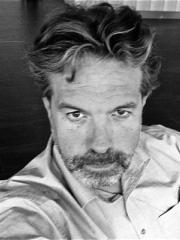
Dr. Frederic Michard, MD, PhD
Critical Care MD PhD trained in Paris, France, and at the Massachussets General Hospital-Harvard Medical School in Boston, USA. Former Chef de Clinique at Assistance Publique-Hopitaux de Paris.
Known for the invention of the Pulse Pressure Variation (PPV), a parameter useful to guide fluid therapy, now displayed on most bedside and hemodynamic monitors.
Architect of acclaimed graphical displays for visual clinical decision support. Former Medical Director & VP-Global Medical Strategy of a California based Medtec company with >$4B annual revenues. Initiator of the Enhanced Surgical Recovery program, the main growth driver for the Critical Care division.
Founder & Managing Director of MiCo, a Swiss consulting firm specialized in digital innovations with medical applications. Published researcher in patient monitoring solutions (>10,000 citations in Google Scholar). Frequent lecturer on cardio-respiratory physiology, monitoring solutions, and digital innovations at national and international conferences.
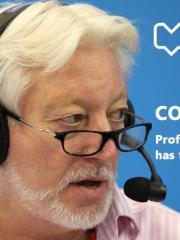
Prof. Monty Mythen
Co Founder and Editor In Chief of TopMedTalk
Monty is the Smiths Medical Professor of Anaesthesia and Critical Care at University College London and Adjunct Professor, Department of Anaesthesiology, Duke University, USA. Monty is also the founding Director of Evidence Based Perioperative Medicine International.
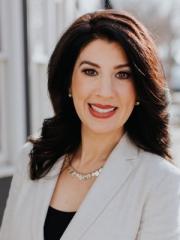
Desiree Chappell
MOM, CRNA and Host of The Roundtable Blog
Board of Directors, American Society of Enhanced Recovery (ASER). A passionate ambassador of Enhanced Recovery and Perioperative Care. Desiree is the creator of the popular Roundtable perioperative care blog: http://periopcareblog.com/


